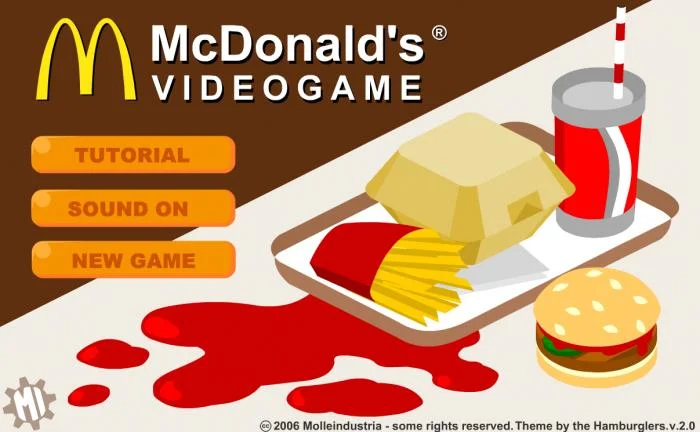The McDonald's Game
The McDonald's videogame, is perhaps the most famous (or infamous) pseudo-game (or anti advergame) created by designer Paolo Pedercini. This piece, heavily critical of every element of the fastfood industry (not just McDonalds, it was just chosen because of the highly recognizable golden arches), put the player in charge of McDonalds as its CEO and lets them make all the business choices. The player can alternate between viewing and making choices for how four different areas: the farmland, the slaughterhouse, the restaurant, and the corporate HQ. The player's money drains rapidly in this game, meaning that if you keep purely to ethical business practices, you soon go out of business. Only by resorting to underhanded dealings (feeding your cows genetically modified grain, bribing public officials so they don't crack down on your questionable actions), can you hope to keep from getting a fairly quick game over.
While slightly exaggerated for dramatic effect, this game does do an exquisite job of highlighting the basic premise that fast food restaurants DO engage in shady behavior in order to keep themselves in business. The fact that the real Mc'Donalds felt that they had to issue a statement (provided below) disavowing any affiliation with or support for this game, would seem to indicate that this light-hearted (the graphics are quite cartoon-like) parody strikes a disharmonious chord. However, while its message is clearly heard, there is no sign of the problem it presents being acted upon. This is a seemingly common problem with the Games for Change genre. Satirizing something does an excellent job drawing attention to a subject, presenting the problem, but much less often does it provide a solution to the problem. The people who see this game fall into three (generally) categories: The Unaware, those who have no idea how to deal with this problem, The Unable, who have an idea for how to solve the problem, but lack the means to do so (money, political/economic power), and the Uncaring, those who benefit from the problem and thus see no need to change what they are doing. Currently the way our society functions, those in the first two categories are unable to oppose decisions made by the third..
"...has no association with McDonald's, and is therefore a complete misrepresentation of our people and our values." (statement issued by McDonalds, no exact online source, but mentioned here: http://purposefulgames.info/post/18006014158/mc-donalds-video-game
and here: http://www.reloaded.org/download/McDonald%5Cs-Videogame/505/ )
Clearly, McDonalds objects to being specifically called out in this parody game. They are concerned that people will play this game and start getting "ideas" about their business practices. They may even lose customers because people who play this game may start to wonder what exactly happened for the food they are about to consume to be produced.
Most likely, they really have nothing to worry about though. Despite this game being out for quite some time, McDonalds business has only continued to grow and expand further. If this game has convinced anyone to stop supporting fast food restaurants, it's a very small minority. People are clearly hearing the message, there is no shortage of online discussion about this game, but that seems to be the extent of the reaction. The problem with why this hasn't had a bigger effect is simple: fast food is just too convenient. In our society where life is constantly on the move, and every moment is important, the ability to quickly acquire and consume sustenance and then quickly return to the daily grind is a crucial aspect of our modern society. McDonalds is too entrenched in how our society functions for anything short of a mass boycott to have any sort of effect on their business practices.
TradeMarkVille(2014) is another piece by Mollendustria (the group Paolo is part of). In this magical world, every word ever uttered is instantly trademarked by "wizard-lawyers" and banished from language, preventing its future use. This game allows players to submit new ways of "saying" a word for evaluation (via a Facebook or Twitter) log in. Like the McDonalds game is critical of the fast food industry, this game is poking light hearted fun at the copyright industry. Unlike the McDonalds game, this game comes with a highscore table so players can compete to see how many amusing new ways to describe words they can find. This actively encourages the user to come up with a solution (even if it is not one that would continue to work in the longer term) to the issue of everything being copyrighted. Again, this game presents a light-hearted way of addressing a very real issue.
Disaffected(2008) is an anti-advergame by Ian Bogost and Persuasive Games. It is a satirical experience that puts the player in the role of an apathetic employee of Kinko's as they are forced to deal with customers and the issues that arise (finding customer’s orders, having to deal with employees who refuse to work, etc). Similar to Mollendustria's work, this game presents a serious issue in a light hearted manner. Also similarly though, this game does not seem to have had any effect on how Kinko's operates. Its message is clearly heard, but not acted upon. This is a seemingly common problem with the Games for Change genre.
Interview with Paolo about the McDonald's Game: http://www.gamasutra.com/view/feature/130980/hot_off_the_grill_la_.php
Mollendustria Games:








